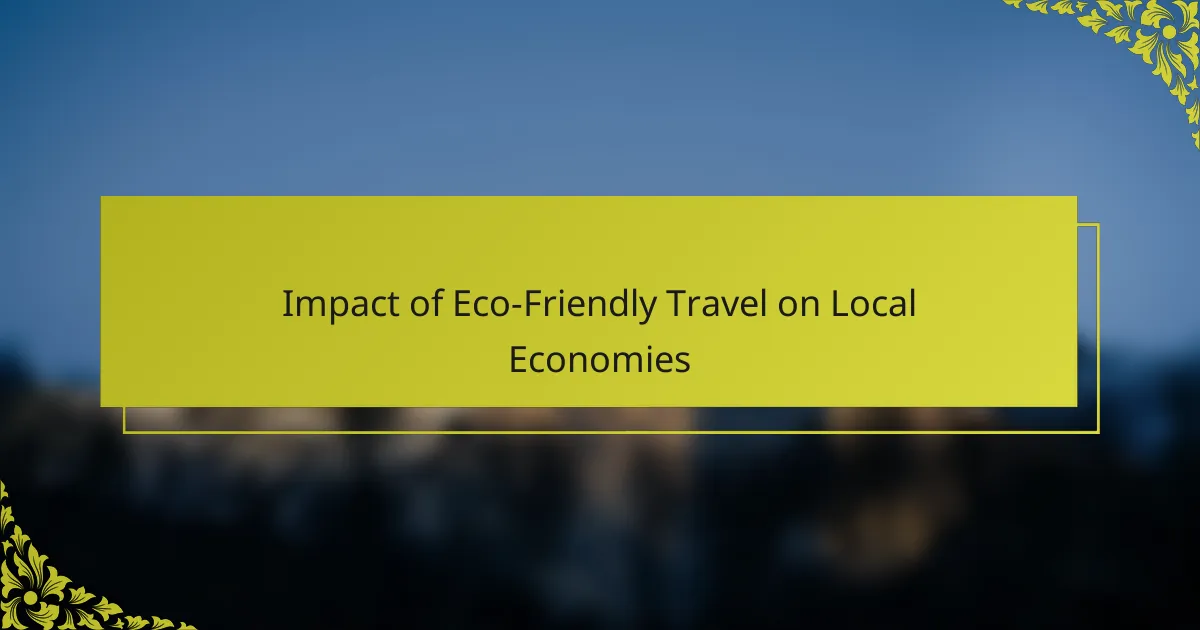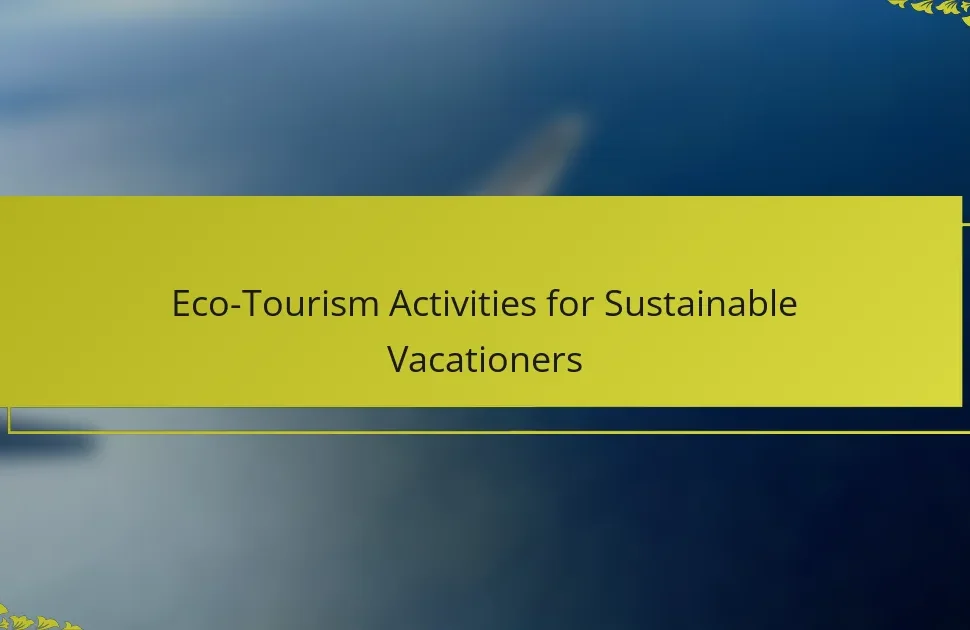Eco-friendly travel significantly boosts local economies by attracting sustainable tourism and enhancing community engagement. This approach promotes job creation, supports local businesses, and encourages the preservation of cultural heritage. Additionally, it leads to improved infrastructure and fosters partnerships among local stakeholders. Overall, investing in eco-friendly travel contributes to long-term economic stability and resilience for communities.

How does eco-friendly travel influence local economic growth?
Eco-friendly travel positively influences local economic growth by attracting sustainable tourism, which boosts local businesses. This type of travel encourages investment in eco-friendly infrastructure, creating jobs and enhancing community resilience. Sustainable tourism often leads to increased visitor spending, benefiting hotels, restaurants, and local artisans. As a result, communities can preserve their cultural heritage while promoting environmental conservation.
What are the direct financial impacts of eco-friendly travel on local businesses?
Eco-friendly travel positively impacts local businesses by increasing revenue and fostering community engagement. Sustainable tourism attracts environmentally conscious travelers who prefer local experiences and products. This trend enhances the profitability of small businesses, such as restaurants and shops, which cater to eco-friendly travelers. As a result, local economies benefit from increased spending, job creation, and investment in sustainable practices. Eco-friendly initiatives can also lead to improved brand loyalty among consumers, further boosting long-term financial stability for local enterprises.
How does eco-friendly travel create job opportunities in local communities?
Eco-friendly travel creates job opportunities in local communities by promoting sustainable practices and supporting local businesses. This approach encourages the development of eco-tourism, which often requires local guides, hospitality staff, and artisans. As a result, communities benefit from increased employment and economic stability. Additionally, eco-friendly travel attracts visitors interested in cultural experiences, further enhancing local job creation. Studies show that regions focusing on sustainable tourism can see a significant rise in local employment rates, fostering community growth and resilience.
Which sectors benefit the most from eco-friendly tourism?
Eco-friendly tourism significantly benefits sectors like hospitality, agriculture, and transportation. These sectors experience increased revenue through sustainable practices and local engagement.
Hospitality gains from eco-conscious travelers seeking eco-lodges and green accommodations. Agriculture benefits as local produce is preferred, enhancing food security and supporting farmers. Transportation sectors see growth in demand for eco-friendly travel options, like electric vehicles and public transport.
Additionally, the conservation sector thrives as eco-tourism funds preservation efforts, promoting biodiversity. Communities often see job creation and improved infrastructure due to increased tourist interest, fostering overall economic development.
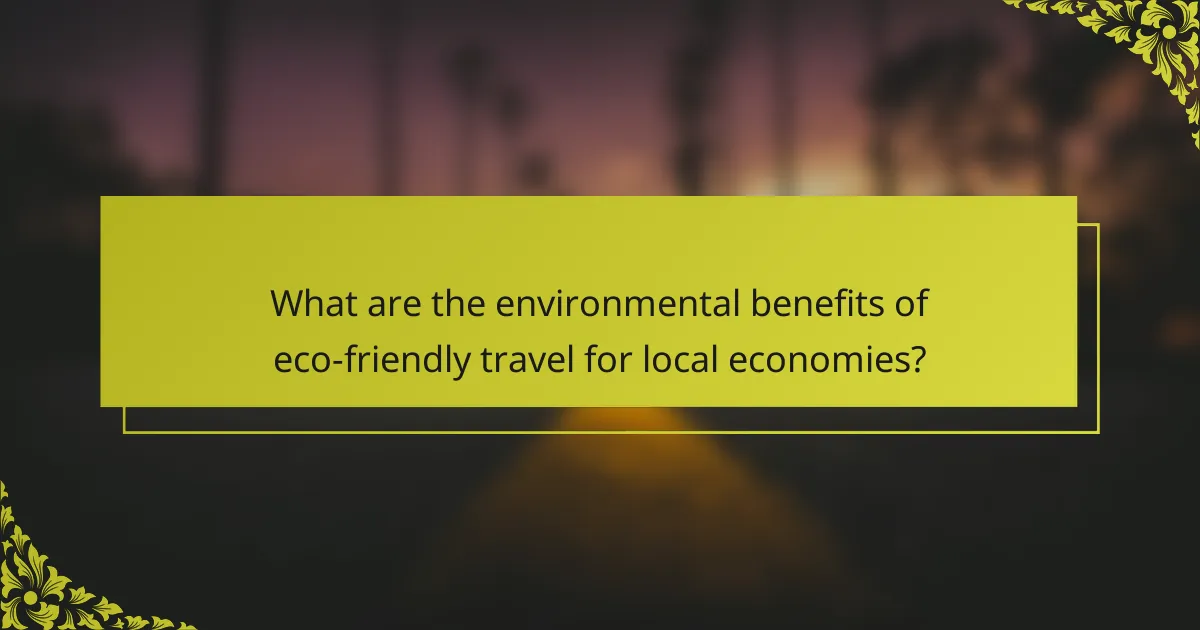
What are the environmental benefits of eco-friendly travel for local economies?
Eco-friendly travel positively impacts local economies by promoting sustainable practices and enhancing community engagement. It increases revenue through eco-tourism, creates jobs in green sectors, and supports local businesses.
Sustainable travel initiatives often lead to improved infrastructure, such as better public transportation and waste management systems. This not only benefits tourists but also enhances the quality of life for residents.
Additionally, eco-friendly travel fosters cultural exchange, allowing local communities to showcase their heritage and traditions. This can lead to a greater appreciation for local culture and encourage the preservation of unique customs.
Overall, investing in eco-friendly travel contributes to long-term economic stability and resilience for local economies.
How does sustainable tourism contribute to environmental conservation?
Sustainable tourism significantly supports environmental conservation by promoting eco-friendly practices. It encourages local economies to prioritize natural resources, leading to responsible management and preservation.
Eco-friendly travel often involves low-impact activities, such as hiking or wildlife observation, which help maintain local ecosystems. For instance, communities that engage in sustainable tourism typically see increased funding for conservation projects. This funding can lead to improved biodiversity and habitat restoration.
Moreover, sustainable tourism fosters awareness about environmental issues. Tourists who participate in eco-friendly travel are more likely to advocate for conservation efforts, influencing local policies. As a result, sustainable tourism creates a positive feedback loop, enhancing both local economies and environmental health.
What role does eco-friendly travel play in preserving local cultures?
Eco-friendly travel significantly supports the preservation of local cultures by promoting sustainable tourism practices. This approach fosters respect for local traditions and encourages travelers to engage authentically with communities.
By prioritizing eco-friendly initiatives, travelers contribute to the economy while ensuring that cultural heritage is maintained. For instance, local artisans benefit from increased demand for traditional crafts, which helps sustain their livelihoods.
Moreover, eco-friendly travel often includes educational components, allowing visitors to learn about local customs and practices. This exchange enriches both travelers and locals, creating a mutual appreciation for cultural diversity.
Ultimately, eco-friendly travel acts as a catalyst for cultural preservation, ensuring that local identities thrive in the face of globalization.

Why do travelers prefer eco-friendly options in their travel experiences?
Travelers prefer eco-friendly options because they positively influence local economies. Eco-friendly travel supports sustainable practices, leading to job creation and increased revenue for local businesses. This approach fosters community engagement and encourages preservation of cultural heritage. Studies indicate that eco-tourism can boost local economies by up to 15% annually. By prioritizing environmentally conscious choices, travelers contribute to a resilient economic framework that benefits both the environment and local communities.
What are the motivations behind choosing sustainable travel practices?
Sustainable travel practices positively impact local economies by promoting job creation, enhancing community engagement, and preserving cultural heritage. Eco-friendly tourism generates income for local businesses and encourages environmentally responsible practices. As a result, destinations benefit from increased visitor spending and improved quality of life for residents.
How does consumer behavior shift towards eco-conscious travel?
Consumer behavior increasingly shifts towards eco-conscious travel, positively impacting local economies. Eco-friendly tourism encourages sustainable practices, attracting environmentally aware travelers who prefer local experiences. This shift leads to increased revenue for small businesses, promotes job creation, and fosters community engagement. Regions that prioritize sustainable tourism often see a rise in visitor numbers, enhancing their economic resilience. Additionally, eco-conscious travelers tend to spend more on sustainable services, further benefiting local economies.

Which unique attributes define successful eco-friendly travel initiatives?
Successful eco-friendly travel initiatives are defined by their emphasis on sustainable practices, community engagement, and environmental conservation. These initiatives often prioritize local sourcing of goods and services, which boosts local economies by keeping financial resources within the community. Additionally, they foster partnerships with local businesses, enhancing tourism experiences while promoting cultural heritage.
Unique attributes include the integration of renewable energy sources in accommodations and transportation, which reduces carbon footprints significantly. Community-led conservation projects also distinguish successful initiatives, as they empower locals to participate actively in preserving their environment while benefiting economically.
As a result, successful eco-friendly travel initiatives not only protect ecosystems but also create resilient local economies that thrive on sustainable tourism practices.
What are some notable examples of eco-friendly travel projects worldwide?
Eco-friendly travel projects significantly boost local economies by promoting sustainable practices and enhancing community engagement. Notable examples include:
1. Costa Rica’s ecotourism initiatives, which generate over $3 billion annually while preserving biodiversity.
2. Bhutan’s unique approach, charging a daily tariff that funds environmental conservation and local development.
3. The Galapagos Islands’ strict visitor regulations that protect ecosystems and support local livelihoods.
4. Iceland’s investment in renewable energy tourism, attracting visitors while reducing carbon footprints.
5. Kenya’s community-based wildlife conservation programs that empower locals and attract eco-conscious tourists.
How do local governments support eco-friendly travel initiatives?
Local governments support eco-friendly travel initiatives through funding, infrastructure development, and community engagement. They allocate budgets for sustainable transport options like bike lanes and electric vehicle charging stations. Additionally, local authorities often collaborate with businesses to promote eco-tourism, enhancing local economies. These initiatives can lead to increased visitor numbers and promote environmental awareness among residents. As a result, local economies benefit from job creation and increased revenue in sectors like hospitality and retail.
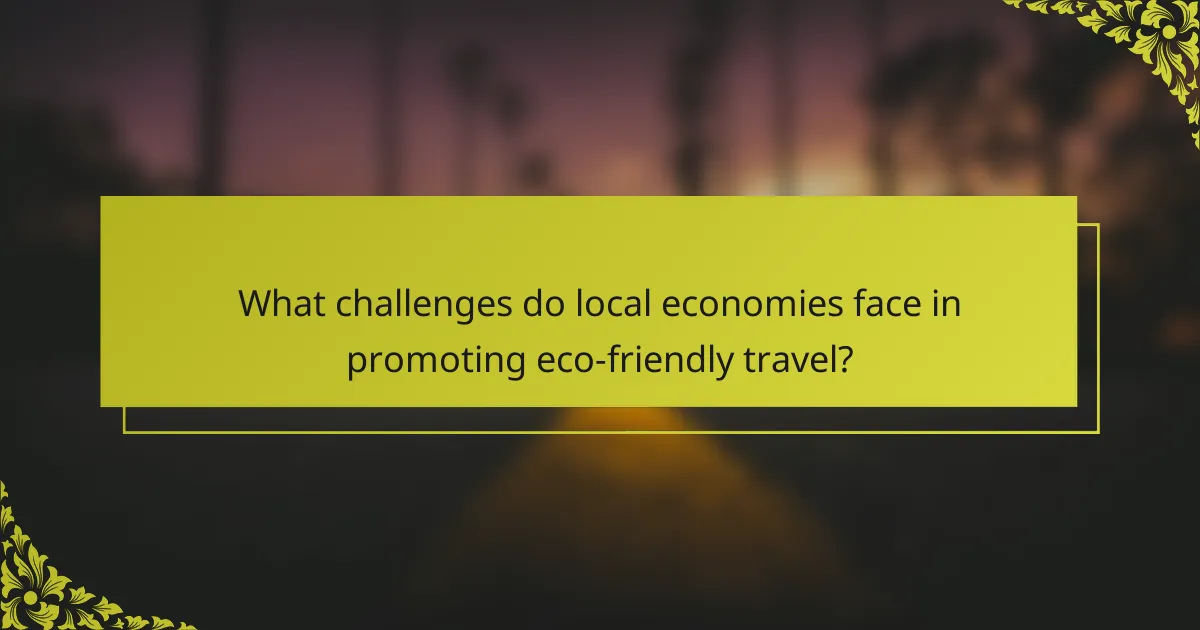
What challenges do local economies face in promoting eco-friendly travel?
Local economies face significant challenges in promoting eco-friendly travel. These include limited funding for sustainable infrastructure, lack of awareness among travelers, and resistance from traditional tourism businesses.
Funding is often insufficient to develop eco-friendly facilities such as green hotels and renewable energy sources. This limits the ability of local economies to compete with conventional tourism offerings. Additionally, many travelers remain unaware of the benefits of eco-friendly travel, leading to lower demand for sustainable options.
Resistance from established tourism businesses can hinder the adoption of eco-friendly practices. These businesses may prioritize short-term profits over long-term sustainability. As a result, local economies struggle to shift towards eco-friendly travel models that benefit both the environment and the community.
How can local businesses overcome barriers to adopting sustainable practices?
Local businesses can overcome barriers to adopting sustainable practices by leveraging community support and resources. Collaborating with local organizations fosters knowledge sharing and access to sustainable technologies. Financial incentives, such as grants or tax breaks, encourage investment in eco-friendly initiatives. Furthermore, educating consumers about the benefits of sustainability can increase demand for green products, motivating businesses to adapt. Finally, showcasing successful local examples of sustainability can inspire others to follow suit, creating a ripple effect throughout the community.
What are the common misconceptions about eco-friendly travel’s impact?
Eco-friendly travel positively impacts local economies, yet misconceptions persist. One common belief is that it generates minimal economic benefits, while studies show eco-tourism can significantly boost local income. Another misconception is that eco-friendly practices deter tourists; in fact, many travelers seek sustainable options. Some think eco-friendly travel is only for affluent individuals, but affordable eco-options are increasingly available. Lastly, there’s a belief that eco-friendly initiatives harm traditional cultural practices, whereas they often promote cultural preservation and community engagement.
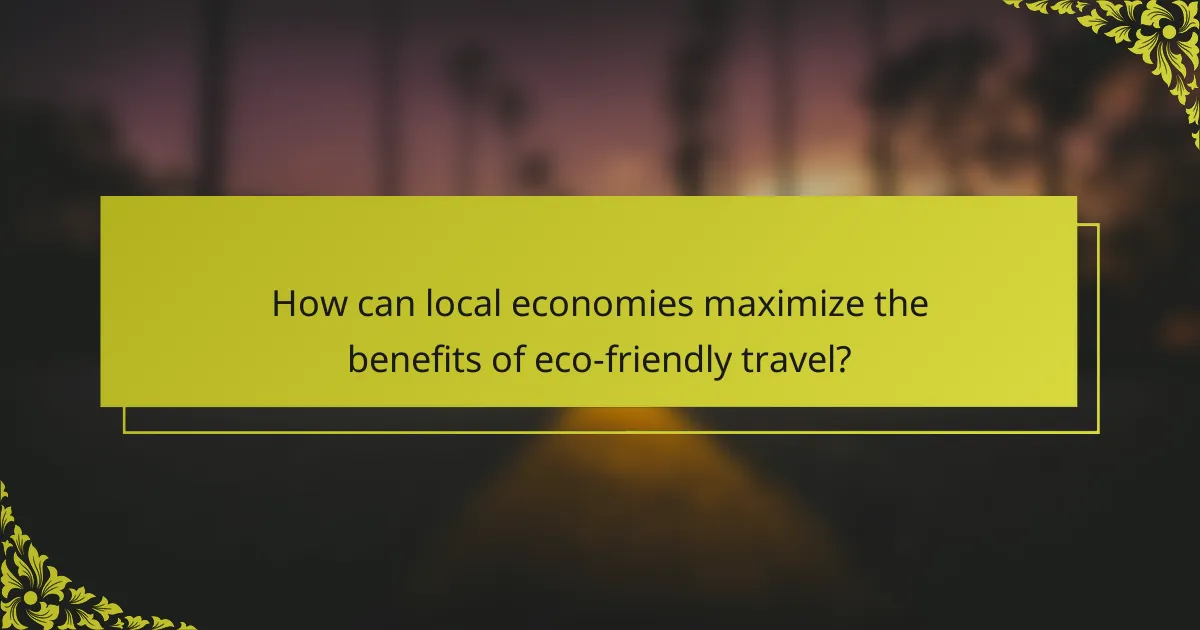
How can local economies maximize the benefits of eco-friendly travel?
Local economies can maximize the benefits of eco-friendly travel by focusing on sustainability and community involvement. Eco-friendly travel generates revenue while preserving local ecosystems. This approach attracts environmentally conscious tourists who prefer authentic experiences.
Investing in green infrastructure, such as renewable energy sources and sustainable transportation, enhances the travel experience. Additionally, promoting local products and services fosters economic growth. Collaboration among local businesses, governments, and communities ensures that the benefits of eco-friendly travel are widely shared.
As a result, eco-friendly travel not only supports local economies but also encourages a sustainable future for communities. This holistic approach can lead to increased visitor satisfaction and repeat tourism.
What best practices should local businesses adopt for sustainable tourism?
Local businesses should adopt sustainable practices to enhance eco-friendly travel’s positive impact on local economies. These practices include minimizing waste, sourcing local products, and promoting conservation efforts.
1. Reduce Waste: Implement recycling and composting programs to decrease landfill contributions.
2. Support Local Suppliers: Partner with local farmers and artisans to strengthen the community economy.
3. Promote Eco-Friendly Transportation: Encourage the use of public transport, biking, and walking to reduce carbon footprints.
4. Educate Tourists: Provide information on sustainable practices and local conservation efforts to raise awareness.
5. Engage in Conservation Projects: Participate in or fund local environmental initiatives to protect natural resources.
These actions not only improve the local economy but also attract environmentally conscious tourists, creating a sustainable tourism model.
How can communities effectively market their eco-friendly travel offerings?
Communities can effectively market their eco-friendly travel offerings by emphasizing local engagement and sustainability. Highlighting unique features, such as cultural experiences and conservation efforts, attracts eco-conscious travelers. Collaborating with local businesses enhances authenticity and supports the economy. Utilizing social media and eco-certifications builds credibility and reaches a broader audience. Engaging storytelling about the impact of eco-friendly practices fosters emotional connections with potential visitors.
What common mistakes should be avoided in eco-friendly travel initiatives?
To maximize the positive impact of eco-friendly travel on local economies, avoid common mistakes such as underestimating local engagement, neglecting cultural sensitivity, overlooking environmental impacts, and failing to measure outcomes.
Engaging local communities fosters sustainable practices and ensures that tourism aligns with their needs. Cultural insensitivity can alienate residents and diminish the travel experience. Ignoring environmental consequences can lead to degradation of natural resources, undermining long-term economic benefits. Lastly, not measuring the outcomes of initiatives prevents learning and improvement.
